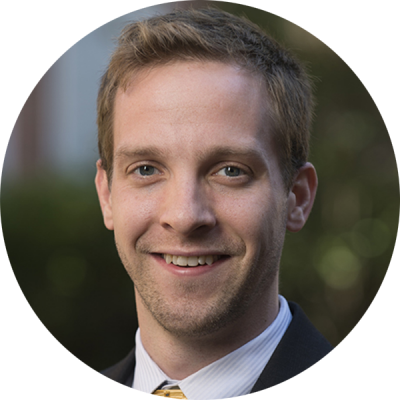
David Herzfeld
My goal is to understand how the neurons of the cerebellum, a region of the brain crucial for motor control and motor learning, contribute to the execution of voluntary eye movements. The cerebellum is a motor learning machine, correcting for movement errors, a process termed adaptation. In our work, we identified the neural substrates responsible for learning to correct eye movement errors. Understanding this adaptation process is critical for informing rehabilitation strategies for individuals with neurological damage or disease. This work was performed in the Laboratory for Computational Motor Control, under the direction of Dr. Reza Shadmehr, professor of biomedical engineering. In addition, much of the credit for this work goes to our close collaborators, Drs. Yoshiko Kojima and Robijanto Soetedjo from the University of Washington National Primate Center.
Questions & Answers
Why did you choose Johns Hopkins for your work?
The Johns Hopkins University School of Medicine and the Department of Biomedical Engineering in particular have been my home for more than seven years. I completed my Ph.D. with Dr. Reza Shadmehr in the Laboratory for Computational Motor Control. Dr. Shadmehr and I have uncovered a number of very interesting contributions of the cerebellum to the control of movements across multiple movement domains, including reaching and eye movements. I remained at Johns Hopkins, in the Department of Biomedical Engineering, to perform a short postdoctoral fellowship with Dr. Shadmehr. My goal during this postdoc was to continue our investigation of the cerebellum’s role in correcting for movement errors.
What does receiving this award mean to you personally and professionally? Do you have any connection with the particular award you received?
Receiving the Paul Ehrlich Award is truly humbling. Dr. Ehrlich is a legend in microbiology and medicine, and is truly a scientific role model. Receiving the Ehrlich Award is an inspiration. There are few individuals who have contributed so greatly to our understanding of disease. My career goal is to help individuals with neurological disorders and disease. Hopefully, I can live up to the excellent role model in Dr. Ehrlich.
What contributed to your project’s success (special skills, interests, opportunities, guidance, etc.)?
All scientific projects are a collaborative effort. This work is certainly no exception; much of the project’s success is due to the amazing contributions of my mentor, Dr. Reza Shadmehr, as well as our collaborators, Drs. Yoshiko Kojima and Robijanto Soetedjo at the University of Washington National Primate Center. Each person brings unique skills to the table, with the goal of understanding a complex problem.
What thoughts do you have about Young Investigators’ Day itself, as a celebration of the roles student and fellows play in research at Johns Hopkins?
I am truly thankful that the Johns Hopkins University School of Medicine has instituted such a wonderful celebration of the accomplishments of graduate student and postdocs. Science is difficult. Many, or most of the time, experiments fail. Sometimes, I feel that it is hard for graduate students/postdocs to see the light at the end of the tunnel. Young Investigators’ Day provides an excellent venue to support the hard work and countless hours spent in the pursuit of scientific truth for many of these individuals.
What has been your best/most memorable experience while at Johns Hopkins?
I recently moved from Johns Hopkins to Duke University. On my last day, my mentor for the last seven years, Dr. Reza Shadmehr, threw a party for me, inviting many other principal investigators and graduate students who I had worked with during my tenure at Johns Hopkins. The whole experience was incredibly moving—not only that my mentor had planned this for me, but that people were so excited to wish me well on the next stage of my scientific journey.
What are your plans over the next year or so?
I recently moved from Johns Hopkins to Duke University to pursue a second postdoctoral fellowship in the laboratory of Dr. Stephen Lisberger. My overall goal is to peruse an NIH K99/R00 grant, which will provide some initial funds for an independent laboratory position.
Tell us something interesting about yourself that makes you unique. Do you have any special hobbies, interests or life experiences?
I don’t know if it makes me unique, but I recently got engaged to my wonderful girlfriend. She is an M.D./Ph.D. student at Princeton and Rutgers universities. I couldn’t be more excited to marry this wonderful woman who has been such an integral part of my life.